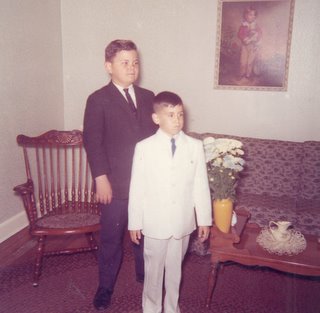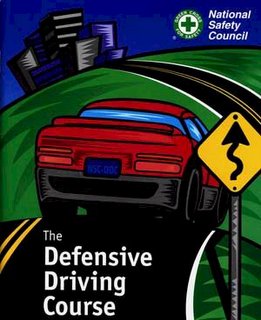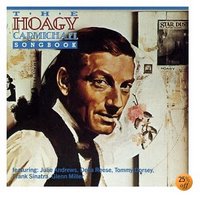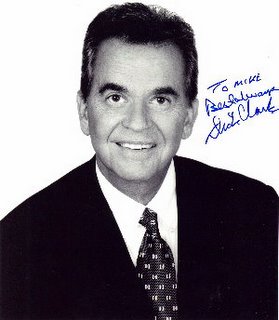
Why did I ever create this post about Oprah without putting more thought into it first? Getting carried away with Oprah's blasting of author James Frey, I had a Tom Cruise moment myself (no, I didn't literally jump up and down on my couch). Unlike Cruise, I can wipe out the whole affair by hitting the "delete post" button. But I do enjoy reading the fervent responses. And I wanted to provoke a discussion on truth, not so much a discussion on the merits of the book.
First point of business: now I remember why I've never been a Oprah fan (see previous post). After the
Little Pieces fiasco, I'm a little leary of her motives with her Book Club, too.
As an English teacher, I usually applaud any medium that promotes reading. Oprah's Book Club has certainly done that, selling millions of books on its recommendation, like
A Million Little Pieces. With the lies uncovered after Oprah's frantic phone call to Larry King Live, Frey alone hasn't lost credibility. The Big O and her Club have taken a stiff uppercut, too. Oprah responded by summoning Frey to the show for a interrogation to get to the truth, to which he surprisingly agreed. Frey was contrite and willing to take the hits coming from not only Oprah, but also from a serious pantheon of writers and critics like Frank Rich, Maureen Dowd, and Joel Stein. Talk about damage control. We ought to appoint Oprah director of F.E.M.A.
On the show, interrogated by Oprah, Frey admitted to . . . lying:
Oprah: I appreciate you being here because I believe the truth can set you free [bad cliche, Oprah]. I realize this has been a difficult time for you … maybe this is the beginning of another kind of truth for you.
James: I think you're absolutely right. I mean, I think this is obvious, this hasn't been a great day for me. It certainly hasn't been a great couple weeks for me. But I think I come out of it better. I mean, I feel like I came here and I have been honest with you. I have, you know, essentially admitted to…to lying.
Oprah: Which is not an easy thing to do.
James: No, it's not an easy thing to do in front of an audience full of people and a lot of others watching on TV. I mean, if I come out of this experience with anything, it's being a better person and learning from my mistakes and making sure that I don't repeat them.
Frey was fried. But later on the show, the panel of experts saw more serious issues behind the
Pieces firestorm.
Maureen Dowd cut to the chase: "James Frey very clearly lied to promote his book and I don't think that should get the Oprah seal of approval. It's just very disappointing that the publishing house doesn't care. They're just counting their money. And readers don't care. It's gone to the top of the bestseller list. But somebody has to stand up for truth. This is not a close call."
On the other hand, Joel Stein from Time magazine commented:"It's wrong and immoral to pass off a piece of fiction as a memoir, and I wouldn't do it. You know, I felt like he was a liar and a weasel. But the more I thought about it, I still loved the book. When I found out a lot of it had been made up, it didn't really change how I felt about the text. But it certainly changed how I felt about the author."
Frank Rich quoted Stephen Colbert of
Comedy Central, who says we live in an age of "truthiness."
He explained: "I mean we live in this word now where this is just sort of the tip of the iceberg, this memoir, where anyone can sort of put out something that sort of looks true, smells a little bit like truth but, in fact, is in some way fictionalized. You look at anything from Enron fooling people and creating this aura of a great business making huge profits when it was an empty shell, or people in the government telling us that mushroom clouds are going to come our way if we don't invade Iraq for months when it was on faulty and possibly suspect intelligence. Or even things we label 'reality' in entertainment like reality television. It's cast. It's somewhat scripted. You see Jessica Simpson and Nick Lachey as happy newlyweds. The reality show is over, they get divorced and split the profits."
Oprah ended the debate this way: "I read this quote in
The New York Times from Michiko Kakutani, who said it best, I think. She says, ' This is not about truth in labeling or the misrepresentation of one author. … It is a case about how much value contemporary culture places on the very idea of truth.' And I believe that the truth matters."
Well said, Ms. Kakutani (and I guess well quoted, Ms. Winfrey). Now if we can ever get everyone to agree
what the truth is.
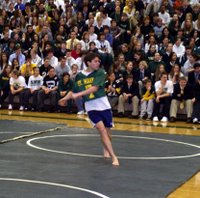
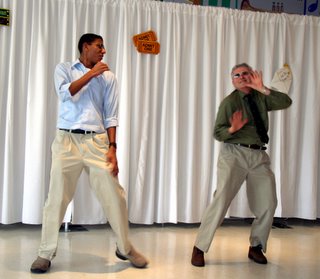
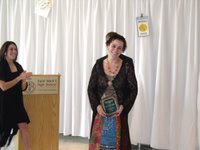 Ms. Susanne Peiffer, a 1994 graduate of St. Mark's, was honored. Ms. Peiffer developed, organized, and has led the school's summer mission trip for the past three years. The mission takes approximately 40 students into impoverished communities, like Appalachia, to perform much-needed work for two weeks. It also gives students time away from "the real world" to develop their spirituality. Students who return from the mission trip often talk of undergoing "life-changing" experiences.
Ms. Susanne Peiffer, a 1994 graduate of St. Mark's, was honored. Ms. Peiffer developed, organized, and has led the school's summer mission trip for the past three years. The mission takes approximately 40 students into impoverished communities, like Appalachia, to perform much-needed work for two weeks. It also gives students time away from "the real world" to develop their spirituality. Students who return from the mission trip often talk of undergoing "life-changing" experiences.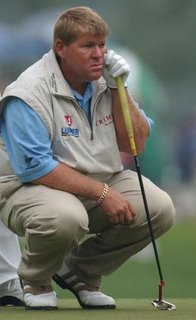

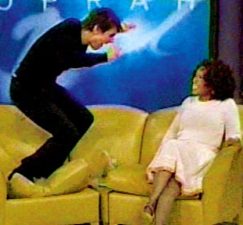
 This metaphor might aptly describe Ken Kesey's One Flew Over the Cuckoo's Nest. In fact, his own "cuckoo's nest" metaphor isn't too bad, either. Kesey borrowed his title from a folk rhyme that has a variety of versions and no known author.
This metaphor might aptly describe Ken Kesey's One Flew Over the Cuckoo's Nest. In fact, his own "cuckoo's nest" metaphor isn't too bad, either. Kesey borrowed his title from a folk rhyme that has a variety of versions and no known author. 

